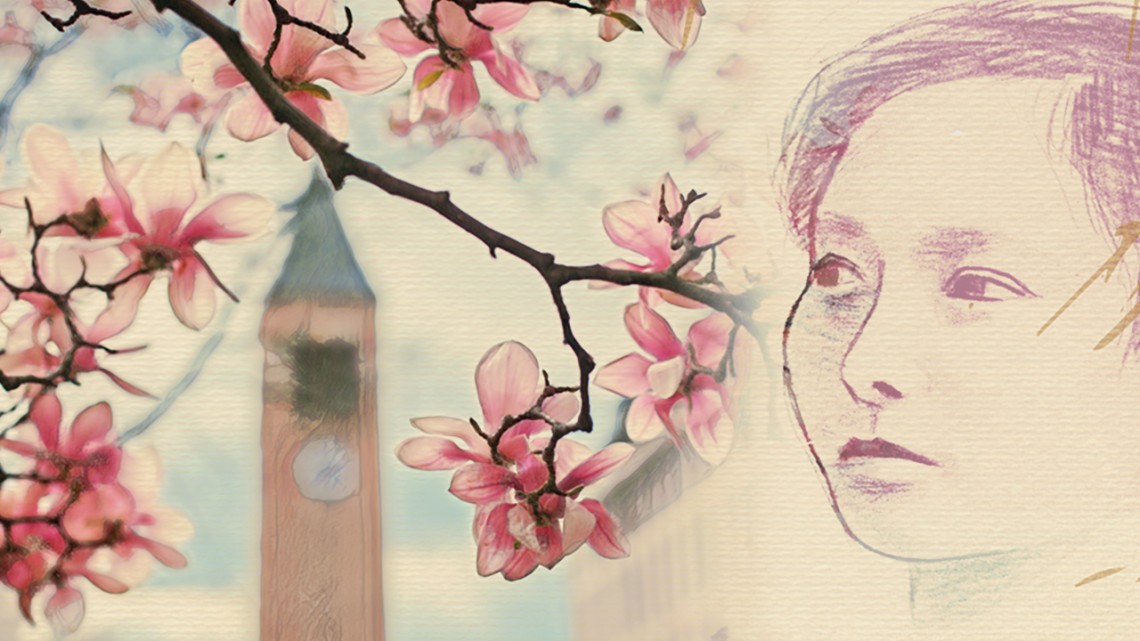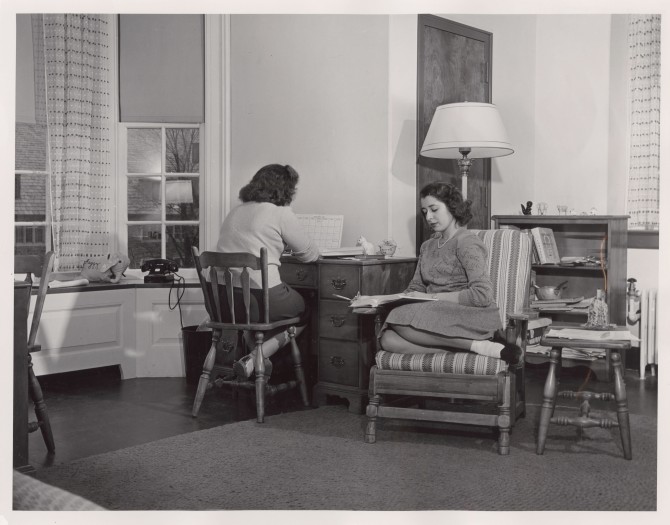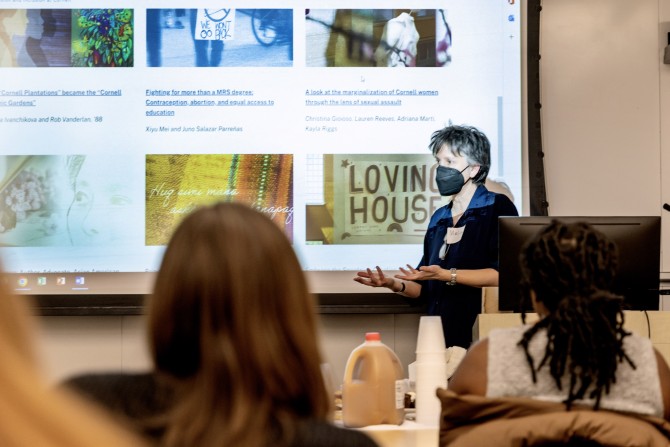
Kimi Gengo, a poet, literary pioneer and advocate for Japanese Americans who attended Cornell from 1924-1925 and 1928-1930 is one of the changemakers featured in Any Person, Many Stories. Her story is shared by Claire Deng, '22.
News directly from Cornell's colleges and centers
Public history project reveals stories of Cornell changemakers
By Carolyn Keller
What does it mean to belong at Cornell?
This is the central question behind “Any Person, Many Stories: Histories of Exclusion and Inclusion at Cornell,” a new public history digital exhibition hosted by the Center for Teaching Innovation. The project uses storytelling methods to take a closer look at Cornell’s past, and engages students, faculty, alumni, staff and community members in a deeper, shared exploration of the university’s aspiration toward “...any person ...any study.”
Eight featured stories take a deeper look at both inclusion and exclusion at Cornell, in the name of creating a more personal account of the university’s shared history. The project plans to share more stories throughout 2023.
It also aims to show how institutional change within Cornell has happened – who past changemakers were, how they achieved the changes they did, and how that progress worked to foster a more inclusive sense of belonging across the university.
That progress took time, effort and belief in society’s ability to change. Several of the stories highlight how students, staff and faculty advocated against restrictive policies or unexamined biased practices that reflected the social patterns of the moment. Students worked to overcome exclusion, racism and bigotry, and sometimes wouldn’t see the results they wanted for years after they graduated, impacting their university experience even as their efforts improved it for future students.
“Reckoning with the past – celebrating pioneers and successes, and documenting failures and limitations – is an important way to create belonging,” said CTI Executive Director Rob Vanderlan ’88, one of the project’s co-founders. “Our hope is that seeing Cornell as an aspiration, as yet imperfectly realized, can help all Cornellians feel a deeper sense of connection.”
A sense of belonging is a result of community building, and it took a community to make “Any Person, Many Stories” happen. While the CTI hosts the project, “Any Person, Many Stories” was brought to life through the dedicated efforts of multiple partners across Cornell. Financial support from the Presidential Advisors on Diversity and Equity (PADE) through the Belonging at Cornell grant initiative, was central to the project’s creation and implementation. So, too, was support from the Cornell Library, the Johnson Museum of Art, Cornell’s Public History Initiative in the College of Arts & Sciences, and the “Any Person Many Stories” advisory board and project steering committee.
The stories published so far span wide-ranging and relevant topics, including the creation of queer inclusive housing at Cornell and the founding of the Alpha Phi Alpha fraternity on campus.
Another story, “Fighting for More than a M.R.S. Degree,” was a collaboration between Feminist, Gender & Sexuality Studies (College of Arts and Sciences) faculty, students and alumni in celebration of “TRANS*forming the Future: 50 years of Feminist and LGBT studies at Cornell.” The story details how in 1968, pre-Title IX and before abortion was legal in New York or nationally, Cornell students organized and advocated for sex education and access to abortion as a means to ensure equal access to education.
Cornell emerges as a leader in certain moments, but only after the hard work of students, staff and faculty who mobilized for change at key moments in the university’s history.
“The themes that emerge as you read the stories are humbling: inclusion doesn’t magically happen,” said Melina Ivanchikova, associate director at the CTI and a project co-founder. “Students, faculty, and staff fought for it ‘then’ and continue to fight for it now. The turning point moments and struggles that the stories document are painful—because the exclusion continues to be real and deeply felt by those who are impacted—and yet the stories are also inspiring.”
The project was an opportunity to invite members of the Cornell community to document, interpret and make meaning out of Cornell’s varied histories and, as Ivanchikova says, “to foster ongoing conversations about what it takes to create change, to see injustice, (and) to understand systems that disadvantage some of us.”
To convey these histories, “Any Person, Many Stories” contributors incorporate a variety of storytelling techniques and interactive multimedia formats, including sketches, biographies, podcasts, interviews, and videos. Each of those formats has its roots in memories and artifacts (many housed in Cornell’s University Archives), conversations, observations, and photos from attics, online photo galleries, and phones.
“This project emerged for me out of an impulse to anchor myself in stories, ever a place of refuge, human connection, and where I can find belonging,” Ivanchikova said. “I wanted to hear stories of resistance, resilience, and to learn more about how our minoritized communities changed Cornell.”
Ivanchikova also works to develop the project’s pedagogical potential, to build a sustainable infrastructure for creating, curating and submitting content, as well as sharing completed projects. She plans to offer faculty development programming that can help to facilitate dialogue, as well as resources for how to create and support assignments that leverage the power of storytelling and offer opportunities for students to conduct research with primary sources.
This part of the “Any Person, Many Stories” project began in fall 2022, when it first entered Cornell classrooms. Eleven instructors have thus far received mini-grants to support their participation in the project. These instructors have incorporated “Any Person, Many Stories” into thirteen courses across a range of departments, disciplines and colleges, including Business; Education; History; American Indian and Indigenous Studies; Feminist, Gender & Sexuality Studies; and Learning Where You Live.
Kurt Jordan, Associate Professor of Anthropology (A&S), and member of the Any Person, Many Stories steering committee, immediately saw the potential for the project to contribute to his Indigenous North America class.
Together with then-AIISP staffer Annabel Young, “we put together a list of possible topics about Cornell’s relationship to Indigenous peoples and the Indigenous homelands it sits upon,” Jordan said. “We also came up with some ‘start here’ sources for each one. Then the students went to work.”
With the course’s enrollment at nearly 100, Jordan worked with Ivanchikova and Vanderlan to walk through possibilities. Students ultimately developed their own pitch and ideas for each of the stories they wanted to tell.
Students then researched their topic, conducted interviews with their subjects or related experts, ventured into relevant archives and with their subject’s permission, brought to the surface a narrative thread that shines a light on a new aspect of Cornell’s past.
Jordan was pleased with his students’ engagement with the project, as well as their completed work.
“The fact that the stories were about Cornell meant that (the students) were all entangled with them to some degree,” said Jordan, who hopes “(students) will provide a set of compelling stories for the Any Person, Many Stories site about Cornell’s relationship to Indigenous lands and peoples.”
Jordan’s students’ stories are now under review for possible publication in the “Any Person, Many Stories’” digital exhibition. Perhaps more important, students now have firsthand experience as active participants in a shared storytelling project. By taking ownership of a complicated history and learning from past Cornellians who worked to make their future – our present – better, students can turn their eyes to the future and create their own roadmap for change.
“We started the project with bold ambitions,” Vanderlan said. “Working with Cornell faculty, students, staff, and alumni to produce these stories has been a journey. The final project looks different than what we could have imagined - it’s more idiosyncratic, messier, but also more moving. We are very proud of the work, and excited to see it grow.”
Media Contact
Get Cornell news delivered right to your inbox.
Subscribe




